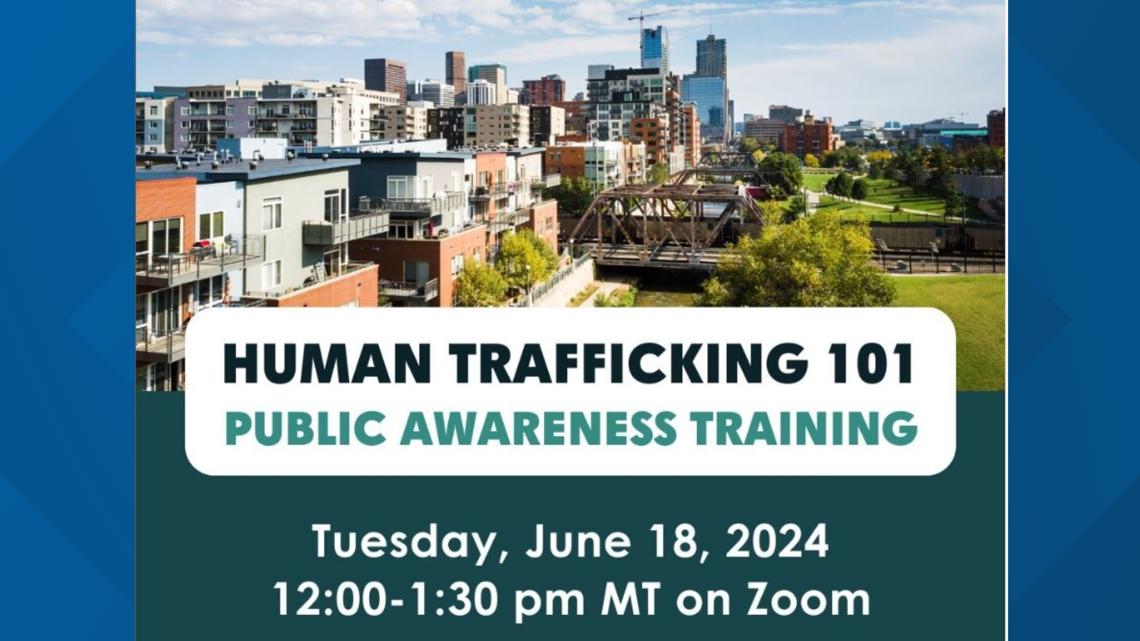DENVER — Human trafficking in Colorado remains a harsh reality. Traffickers often lure in their victims with false promises of employment or better opportunities, trapping them into forced labor or sexual exploitation.
“There’s a lot of misinformation out there,” said Kara Napolitano, research and training manager at Denver’s Laboratory to Combat Human Trafficking (LCHT). “The narrative is that trafficking is only sex trafficking, and sex trafficking only happens to females, and they’re always kidnapped by a scary male perpetrator. But that narrative happens about 1% of the time. We really want to expand that definition and make sure people understand labor trafficking is more prevalent than sex trafficking.”
The Department of Homeland Security describes human trafficking as modern-day slavery. It includes crimes such as debt manipulation, forced criminality, forced labor, domestic servitude, exploitation, and sextortion.
Despite efforts by law enforcement and anti-trafficking organizations, Napolitano said the secret nature of this crime can make it difficult to identify and rescue victims.
“So much of this is hidden,” said Napolitano. “So much trafficking never gets reported.”
Since Colorado passed stronger anti-trafficking laws in 2014, state data shows around 300 cases have been reported but only 55 of them have been prosecuted. Napolitano said those numbers don’t necessarily paint the full picture because not all survivors are willing to relive the trauma in court. She said Colorado’s Human Trafficking Hotline receives around 1,200 calls a year.
“I think people kind of put it away, right,” said Napolitano. “It’s a thing that happens over there or far away from here, but this is something that happens locally. We see it happening in Colorado in agriculture, ranching, or anywhere where migrant farm workers work. We see it happening in construction or hospitality or even domestic service where someone is living and working in someone else’s home and that person, there for, has a lot of power.”
The United States Department of Justice reports anyone can be a victim of human trafficking, but some are more vulnerable than others, including people with disabilities, migrants, children in the juvenile justice or foster care system, folks living in poverty, the homeless, someone who just relocated, and kids who don’t feel safe at home.
You have a chance to learn about human trafficking crimes happening in Colorado and the knowledge you gain could help turn a victim into a survivor.
Denver’s Laboratory to Combat Human Trafficking is hosting the webinar “Public Awareness: Human Trafficking in Colorado 101.”
The goal of this training is to bust myths, share how the problem is impacting our region, and help give victims the power to become survivors.
The training is on Tuesday, June 18 from 12 p.m. to 1:30 p.m. on Zoom.
Registration is open now. Click here to sign up.


SUGGESTED VIDEOS: Investigations from 9Wants to Know
> Top stories curated daily just for you! Sign up for the 9NEWSLETTER to get can’t-miss stories, Next and Broncos content, weather and more delivered right to your inbox.
MORE WAYS TO GET 9NEWS
Subscribe to our daily 9NEWSLETTER
Download the 9NEWS APP
iTunes: http://on9news.tv/itunes
Google Play: http://on9news.tv/1lWnC5n
HOW TO ADD THE 9NEWS APP TO YOUR STREAMING DEVICE
ROKU: add the channel from the ROKU store or by searching for KUSA.
For both Apple TV and Fire TV, search for "9news" to find the free app to add to your account. Another option for Fire TV is to have the app delivered directly to your Fire TV through Amazon.

